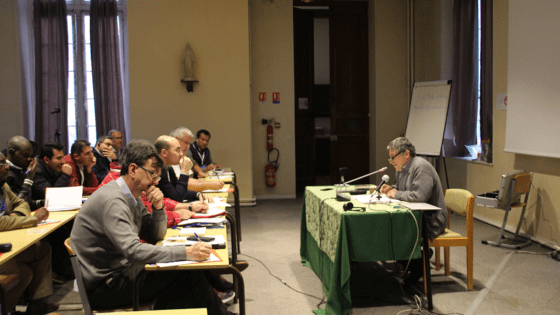From Monday 19 November through Friday 30 November 2018 the International Formation Center (CIF) gathered about 60 Vincentian confreres, representing 90 countries from around the world, at the Motherhouse in Paris to share and learn how they might better create and promote a culture of vocations in the Congregation of the Mission worldwide. All of the men who gathered were engaged at some level with vocation promotion.
Day 4: Thursday 22 November
Fr. Andrés Motto, C.M. led the group in a discussion of the history and tradition of Vincentian vocations as well as the contributions of St. Vincent de Paul to the theology of vocations.
Historical Context: Trent: reaffirmed the institution of priesthood; it stressed how religious life should be led. Every bishop had to found a seminary for the ministers of God. It introduced tonsure, the study of scripture, the need to go to Mass (not necessary take communion) and go to confession. A priest had to dress in a good manner, avoid luxury, not go to dances, avoid worldly distraction, not carry weapons, etc. The priest is called by God, a man of the church and an example for the rest of the faithful; a person of good conduct and good doctrine. He is to care for souls and be as virtuous as possible, a reference of goodness for his parishioners. In France these decrees had little impact: those who made money out of corruption were against changing the situation. So in France reform was very important. In July 1615 the assembly of the clergy of France accepted the Trent reforms; this started a great reform in France. Vincent joined (with Bérulle, Olier, etc.) to try to make the reforms implemented. Richelieu was behind the reform. It was a time of vocational abundance: there were 10,000 clerics in France. In Chatillon there was a pastor and 6 vicars (and this was a small village). A number of clergy lacked training and didn’t perform well in ministry; alcoholism was not uncommon, liturgical mistakes were abundant. There were theological problems/irregularities. Some religious congregations were very large. The papal nuncio had some problems with the situation. One problem was trying to determine an “authentic” vocation. Who decided they would take this path in life? At the time it was their families who made the decision to become a member of the clergy; done sometimes to obtain power or for income (a benefice), or to promote oneself (move up in stature in society/status), etc. In 1615 reform starts in France and spreads rapidly; in 10 years there were lots of seminaries and someone was needed to run them. St. Vincent helped things to get better. Vincent’s original motivation was to help his family establish themselves financially. In his writings Vincent did not discuss his vocation; we have no idea who invited him to join the clergy.
Vincent’s idea of vocation is based on his experience. He studied and read the spiritual masters of the time. He knew it was difficult to train the clergy. But the long-term solution is the proper training of the clergy. He invents the first systematic attempt to train via Tuesday Conferences, etc. Everything is directed to bring the gospel to the poor and to love the poor. There were 3 kinds of seminaries: the full free-standing seminary; a seminary in which the student eats and works there but studies in a theology university; and one in which the seminarian lives in a parish, studied theology in the college and had a pastoral basis from the beginning. Vincent says the priest imitates Christ’s ministerial life and the brother imitates Christ’s private life so these are integral images.
Vincent had no problem sending his seminarists to another congregation that he thought would be good for them (to a religious or diocesan seminary). There was no jealousy; he was happy that other congregations would grow; they were all working for the glory of God; in heaven everyone will be equal. In terms of numbers, Vincent didn’t mind that we were few in number; in 1635 he still thinks this way. He tells Fr. Portail that he fears getting huge in number; he wants quality over quantity. When bishops want more priests he tells Portail that “only God can be everywhere.” Vincent wants to know “holy indifference” which is a reference to the fact that God chooses the clergy and not us; we do not force a vocation. Vincent tells directors of retreats not to entice a vocation towards the C.M. but candidates should go where they feel called; let God make the choice. Before the person enters formation it is critical to know that God is calling him to join in order to confirm and enhance our charism. And service must be at the center of the motivation.
For Vincent scripture spoke of the call of vocation: Judges 1:8 and Psalm 48, John 6. Help young people not to rush things. Vincent wants candidates with a “good spirit.” Virtues that allow for Christian life. Vincent is concerned when parents are too focused on rules and excessive attachment. Enter the community with a spiritual retreat because it helps them to see why they came!
In the afternoon Fr. Andrés Motto gave the confreres a veryyy loooong Vincentian tour of Paris (including Hotel Lutetia, San Sulpice, Luxembourg Gardens, the remains of Bons Enfants, Irish College).
Rev. Jim Osendorf, C.M.
Vincentian Vocation Director
Western Province USA


